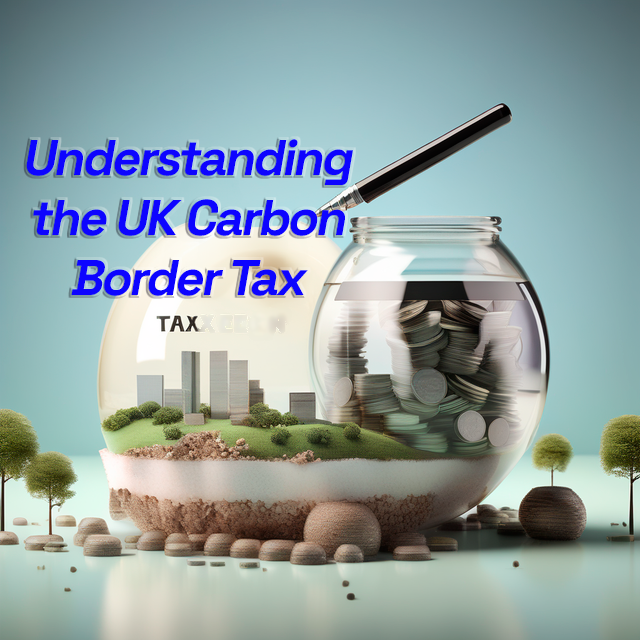In the face of the growing climate crisis, nations worldwide are actively seeking innovative solutions to curb carbon emissions and promote sustainable practices. Following the EU's implementation of the Carbon Border Tax in October 2022, the United Kingdom has embarked on a 12-week Carbon Border Tax consultation, aiming to address carbon leakage and incentivise global trade partners to adopt greener practices. Let's delve into understanding and navigating the UK Carbon Border Tax, its key aspects, benefits, and potential challenges of the UK Carbon Border Tax.
To find out more about Carbon Literacy Training click here: Carbon Literacy Training
Executive Summary
On March 30, 2023, the UK Government initiated a comprehensive consultation on "addressing carbon leakage risk to support decarbonisation." This extensive consultation encompasses various interconnected policies, including a Carbon Border Adjustment Mechanism (CBAM), Mandatory Product Standards (MPS) on embodied emissions, and measures to boost demand for low-carbon products. The consultation period extends for 12 weeks, concluding on June 22, 2023. UK to press ahead with carbon border tax in 2026 (ft.com)
Overview
Background: In May 2022, the UK Government committed to a consultation on CBAM, addressing the critical issue of carbon leakage. This phenomenon arises when carbon-intensive production relocates to regions with less stringent climate policies, leading to increased global emissions or the replacement of UK products by more carbon-intensive imports.
Government Departments Involved: HM Treasury and the Department for Energy Security and Net Zero are spearheading the consultation. It is structured in two parts, with Part 1 presenting options related to CBAM, MPS, product labeling, public procurement, and green private procurement. Part 2 outlines proposals on emissions reporting.
Sectoral Coverage
The consultation initially covers sectors such as cement, chemicals, glass, iron and steel, non-ferrous metals, non-metallic minerals, paper and pulp, refining, fertilizers, and power generation. However, the government acknowledges that the risk of carbon leakage may evolve over time, potentially extending to non-industrial sectors like agriculture or timber.
Carbon Budget Adjustment Mechanism (CBAM)
Objective: CBAM is a pivotal component designed to address carbon leakage and support the UK's Net Zero ambitions. It aims to put a price on carbon emitted during the production of carbon-intensive goods entering the UK.
Scope: The consultation considers the application of CBAM to Scope 2 and Scope 3 emissions, use of emissions data, carbon pricing, and payment schedules. It also delves into customs arrangements for CBAM.
Mandatory Product Standards (MPS)
Pilot Program: Following earlier calls for evidence, the government plans to pilot MPS on embodied emissions in select sectors. MPS sets an upper limit on the embodied emissions for products in the UK market, prohibiting those exceeding defined limits.
Considerations: The consultation seeks input on targeting specific sectors (steel, cement, concrete, and chemicals), emissions scope, application timing, and whether MPS should apply to imports.
Timelines to Implementation
Proposed Timeline: The government plans to introduce embodied emissions reporting in 2025, followed by phased CBAM implementation in 2026, aligning with reforms to the UK Emissions Trading Scheme (ETS) allocation of free allowances. MPS would be introduced in the late 2020s after successful pilots.
Addressing Trade Concerns
Government Commitment: The government aims to implement CBAM and other measures in a manner consistent with free and open trade, upholding WTO rules, and respecting international climate change obligations. However, challenges include treatment of developing country exports, international alignment on methodology, and support for UK exports.
Boosting Demand for Low Carbon Products
Initiatives: The consultation seeks input on three avenues to grow the market for low carbon products—product labelling and voluntary standards, public procurement, and private procurement through buyer alliances.
Emissions Reporting Framework
Options: The consultation outlines options for designing an emissions reporting framework, including methodology, default values, metrics, scope, IT systems, and practicalities of reporting and verification.
Next Steps
Response Deadline: Businesses have until June 22, 2023, to respond to the consultation. Businesses must assign internal responsibility, determine customs codes, and develop strategies for engaging with the government.
Conclusion
The UK Carbon Border Tax marks a pioneering step toward addressing carbon leakage and promoting global emission reductions. By placing a financial burden on carbon-intensive imports, the tax encourages businesses to adopt sustainable practices while safeguarding domestic industries. Despite challenges, the benefits in driving innovation, stimulating investment, and reinforcing the UK's global leadership in climate action outweigh the concerns.
Carbon Literacy Training
Carbon Literacy Training is a great way to start your journey towards carbon net zero. It is a way to engage your staff and encourage them to help you identify ways to reduce your carbon emissions and very often reduce your business expenses.
To find out more about Carbon Literacy Training click here: Carbon Literacy Training
Special Offer to Businesses
We are keen to help as many people as possible become Carbon Literate. To make this financially viable for the businesses we will consider accepting payment for the training in the form of inventory or store gift cards. By doing this we reduce the cash expense to the business, move some inventory and we receive value for our efforts. For more information about this please contact me at ian@positivecarbonimpact.com
To find out more about Carbon Literacy Training click here: Carbon Literacy Training



Comments